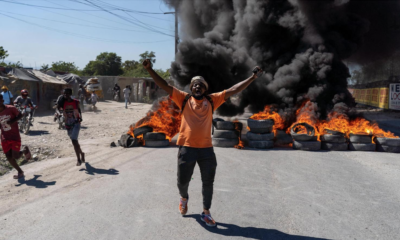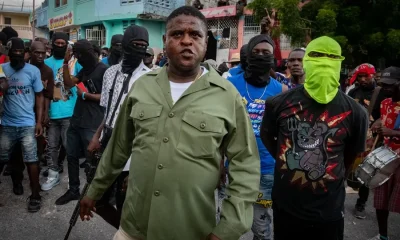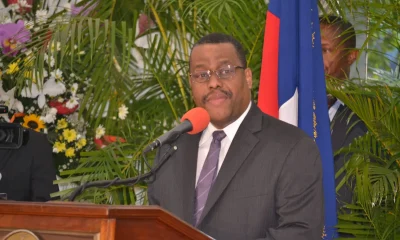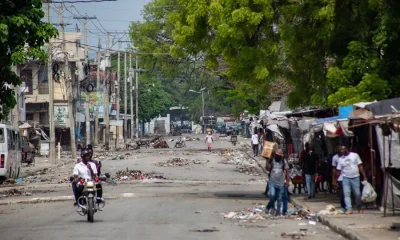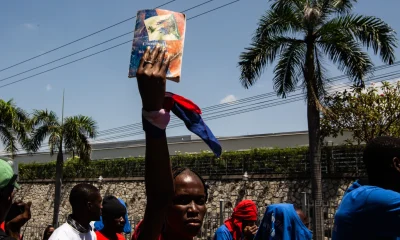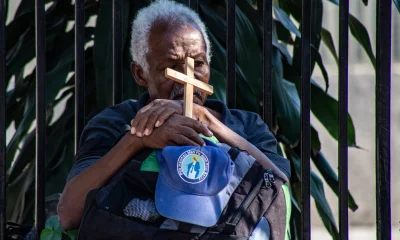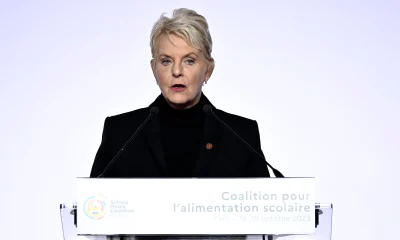International
Tackling hunger in Haiti, the arduous task of the World Food Program
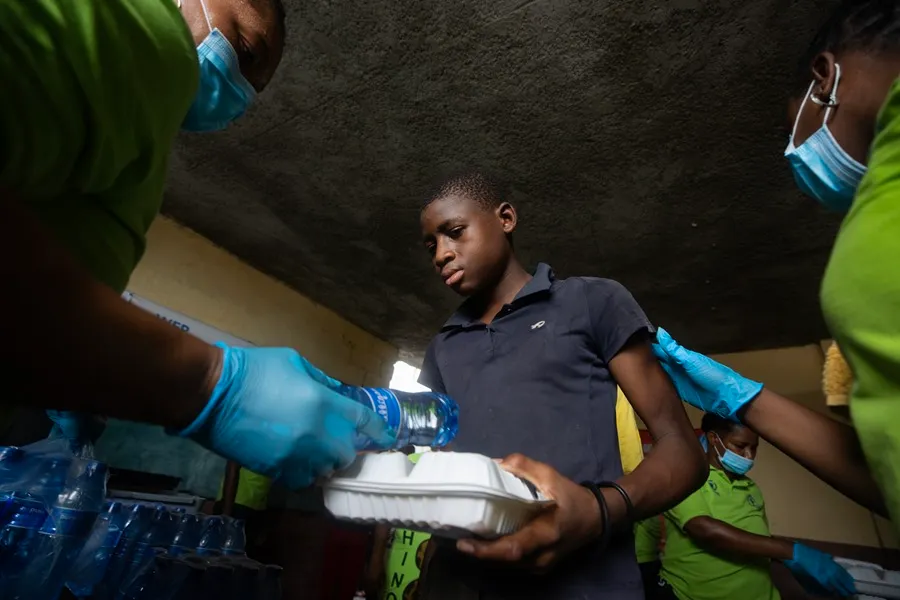
In the Central Kitchen of the World Food Program (WFP) in the capital of Haiti, dozens of people work against the clock to fight hunger: some cut food, others cook in huge pots, some carry trays in vehicles to deliver them to the camps where thousands of families wait for that plate of food, sometimes the only one of the day.
One of those shelters is the Isidor Jean Louis School, in the center of Port-au-Prince, which has been welcoming 600 refugees for months after leaving their homes due to the violence of the armed gangs. There EFE accompanies the WFP.
One of those staying at that hostel is Elva Senfró, 85 years old. He has been there for months after fleeing the neighborhood by his son in the middle of a cruel gang attack.
“The gang was attacking the neighborhood, burning the houses, and my son ran me out of the place and brought me to school, where I have been living for five months (…) I would like to eat something every day, but it is not like that, it is only possible when they bring me something,” this old woman tells EFE.
In Haiti, about five million people (almost half of the population) face acute food insecurity and, of them, 1.64 million face “emergency” levels, according to the data handled by WFP. They are the highest rates since the 2010 earthquake, which caused about 300,000 deaths.
In recent years, Haiti has experienced a steady increase in hunger, and the prevalence of acute food insecurity went from 35% in 2019 to almost 50% in 2024.
Something that the director of the WFP in Haiti, Jean-Martin Bauer, insists on in statements to EFE: “There are five million people who have difficulty getting food. They are people who don’t know what they are going to eat tomorrow, who don’t have money to know if they are going to eat the next day.”
Among the most affected areas is the Artibonite Valley, considered the country’s barn and where armed groups have seized agricultural land and stolen crops.
The department of the West, the rural areas of the south and several poor neighborhoods of the capital, such as Croix des Bouquets and Cité Soleil, with important hotbeds of hunger, are also a cause for concern.
“Artibonite is an area that produced a lot of food for the country and now they themselves have nothing to eat, due to the violence,” explains Bauer, who estimates that there are 3,000 producers who cannot cultivate the land and abandoned it due to the violence of the gangs.
Around two in the afternoon, the staff of the Center for Peasant Animation and Community Action (CAPAC), one of the local organizations with which the WFP works, arrive at the Isidor Jean Louis College.
It is an operation that they carry out daily: some quickly go to school and take the food to a room on the second floor, while others organize the refugees to proceed with the delivery of lunch.
The little ones lead the line, and they are followed by the elderly and pregnant women. They receive a tray of rice with fish and a bottle of water.
The rest of middle-aged people, between pushing and arguments, take a long time to organize to enter the room. When the food is already in his hands, everyone goes to the place of the school where he resides and eats in silence, enjoying every bite.
“The population wants security. People who go to church with the children, who go to school, who go to the market, are afraid and are leaving little because they don’t want to be kidnapped on the street. The population doesn’t deserve that, it deserves a better life,” says Bauer.
And he adds: “Those of us who work on the humanitarian issue would like to see freedom of movement on the street. If there is so much hunger, it’s because the producers can’t get to sell to the capital. We want to see the producers leave the Artibonite and enter the capital to sell their products. That they bring good food to the markets. That is the most important issue for the food system.”
Central America
Senator Van Hollen Meets with Deported MS-13 Member in El Salvador; Trump and Bukele React

U.S. Democratic Senator Chris Van Hollen, representing the state of Maryland, held a meeting in El Salvador with deported MS-13 gang member Kilmar Ábrego García, a member of the criminal group classified by the U.S. government as a terrorist organization.
“Kilmar Ábrego García, miraculously resurrected from the ‘extermination camps’ and ‘torture chambers,’ now sipping margaritas with Senator Van Hollen in the tropical paradise of El Salvador!” wrote President Nayib Bukeleon X (formerly Twitter), sharing photos of Van Hollen, Ábrego García, and a lawyer sitting together at a Salvadoran hotel.
The deported gang member is seen wearing a plaid shirt and a flat-brimmed cap, seated at a table with glasses and coffee cups. The senator also shared images of the meeting on his own social media accounts.
Bukele reaffirmed that Ábrego will remain in El Salvador and will not be returned to the United States.
“Now that his health has been confirmed, he has earned the honor of remaining under the custody of El Salvador,” Bukele added.
Former U.S. President Donald Trump criticized the senator’s meeting with Ábrego on Truth Social, calling Van Hollen “a fool” for advocating for Ábrego’s return to the U.S.
International
Pope Francis Appears for Easter Blessing, Calls for Peace and Religious Freedom

Pope Francis, still recovering from pneumonia, appeared on the balcony of St. Peter’s Basilica in the Vatican on Easter Sunday and, with a faint voice, wished a “Happy Easter” to the thousands of faithful gathered to celebrate the Resurrection of Christ.
A month after being discharged from a lengthy hospital stay, the presence of the 88-year-old pontiff had remained uncertain, with the Vatican not confirming his attendance ahead of time.
Eventually, the pope made a brief appearance in a wheelchair shortly after 12:00 p.m. (10:00 GMT) to deliver his traditional “Urbi et Orbi” blessing (“to the city and to the world”).
Although no longer wearing an oxygen cannula, the Argentine Jesuit relied on a close aide to read his Easter message, which touched on major global conflicts.
Francis condemned the “dramatic and unworthy humanitarian crisis” in Gaza and called for a ceasefire, while also expressing concern over the “growing climate of antisemitism spreading across the globe.”
He further emphasized the importance of religious freedom and freedom of thought, stating that without mutual respect, “peace is not possible.”
International
Thousands rally nationwide against Trump’s threat to U.S. democracy

Thousands of protesters gathered on Saturday (April 19, 2025) in major cities like New York and Washington, as well as in small communities across the United States, in a second wave of demonstrations against President Donald Trump. The crowds denounced what they view as growing threats to the country’s democratic ideals.
In New York City, demonstrators of all ages rallied in front of the Public Library near Trump Tower, holding signs accusing the president of undermining democratic institutions and judicial independence.
Many protesters also criticized Trump’s hardline immigration policies, including mass deportations and raids targeting undocumented migrants.
“Democracy is in grave danger,” said Kathy Valyi, 73, the daughter of Holocaust survivors. She told AFP that the stories her parents shared about Adolf Hitler’s rise to power in 1930s Germany “are happening here now.”
In Washington, demonstrators voiced concern over what they see as Trump’s disregard for long-standing constitutional norms, such as the right to due process.
-

 International4 days ago
International4 days agoArsenal stun Real Madrid at the Bernabéu to reach Champions League semifinals
-

 Central America3 days ago
Central America3 days agoNicaraguan Exiles to Mark 7th Anniversary of 2018 Protests with Global Commemorations
-

 International3 days ago
International3 days agoDominican ‘False Hero’ Arrested for Faking Role in Nightclub Collapse That Killed 231
-

 International2 days ago
International2 days agoACLU seeks emergency court order to stop venezuelan deportations under Wartime Law
-

 International4 days ago
International4 days agoBogotá residents line up for yellow fever vaccine amid national alert
-

 International4 days ago
International4 days agoDeSantis’ immigration crackdown sparks alarm in Venezuelan Communities in Doral
-

 Central America2 days ago
Central America2 days agoUN complaint filed against Costa Rica over detention of migrant children
-

 International4 days ago
International4 days agoMexico refuses to restore ties with Ecuador while Noboa remains in office
-

 International1 day ago
International1 day agoThousands rally nationwide against Trump’s threat to U.S. democracy
-

 Central America9 hours ago
Central America9 hours agoSenator Van Hollen Meets with Deported MS-13 Member in El Salvador; Trump and Bukele React
-

 International9 hours ago
International9 hours agoPope Francis Appears for Easter Blessing, Calls for Peace and Religious Freedom














